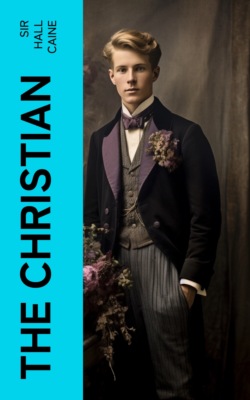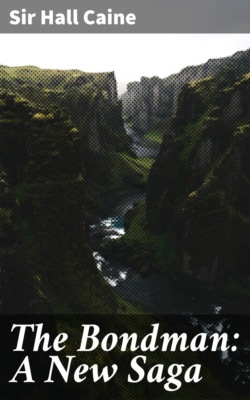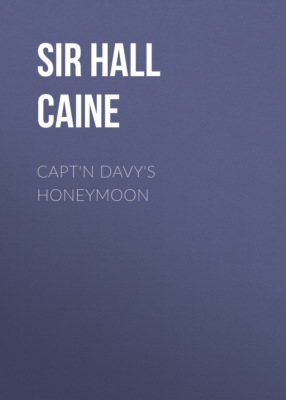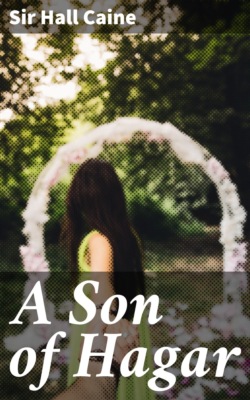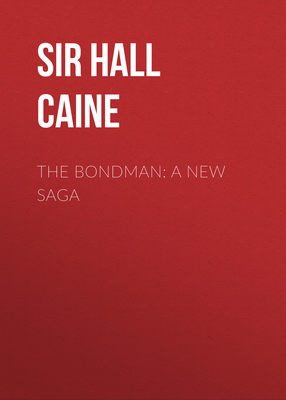Kitabı oku: «The Deemster», sayfa 8
CHAPTER XI
THE HERRING BREAKFAST
It was between four o'clock and five when the fleet ran into Peeltown harbor after the first night of the herring season, and toward eight the fisher-fellows, to the number of fifty at least, had gathered for their customary first breakfast in the kitchen of the "Three Legs of Man." What sport! What noisy laughter! What singing and rollicking cheers! The men stood neither on the order of their coming nor their going, their sitting nor their standing. In they trooped in their woolen caps or their broad sou'westers, their oilskins or their long sea-boots swung across their arms. They wore their caps or not as pleased them, they sang or talked as suited them, they laughed or sneezed, they sulked or snarled, they were noisy or silent, precisely as the whim of the individual prescribed the individual rule of manners. Rather later than the rest Dan Mylrea came swinging in, with a loud laugh and a shout, and something like an oath, too, and the broad homespun on his lips.
"Billy Quilleash – I say, Billy, there – why don't you put up the young mastha for the chair?"
"Aw, lave me alone," answered Billy Quilleash, with a contemptuous toss of the head.
"Uncle Billy's proud uncommon of the mastha," whispered Davy Fayle, who sat meekly on a form near the door, to the man who sat cross-legged on the form beside him.
"It's a bit free them chaps is making," said old Billy, in a confidential undertone to Dan, who was stretching himself out on the settle. Then rising to his feet with gravity, "Gen'l'men," said Quilleash, "what d'ye say now to Mistha Dan'l Mylrea for the elber-cheer yander?"
At that there was the response of loud raps on the table with the heels of the long boots swung over various arms, and with several clay pipes that lost their heads in the encounter. Old Billy resumed his seat with a lofty glance of patronage at the men about him, which said as plainly as words themselves, "I tould ye to lave it all to me."
"Proud, d'ye say? Look at him," muttered the fisherman sitting by Davy Fayle.
Dan staggered up and shouldered his way to the elbow-chair at the head of the table. He had no sooner taken his seat than he shouted for the breakfast, and without more ado the breakfast was lifted direct on to the table from the pans and boilers that simmered on the hearth.
First came the broth, well loaded with barley and cabbage; then suet puddings; and last of all the frying-pan was taken down from the wall, and four or five dozen of fresh herrings were made to grizzle and crackle and sputter over the fire.
Dan ate ravenously, and laughed noisily, and talked incessantly as he ate. The men at first caught the contagion of his boisterous manners, but after a time they shook their tousled heads and laid them together in gravity, and began to repeat in whispers, "What's agate of the young mastha, at all, at all?"
Away went the dishes, away went the cloth, an oil-lamp with its open mouth – a relic of some monkish sanctuary of the Middle Ages – was lifted from the mantel-shelf and put on the table for the receipt of custom; a brass censer, choked with spills, was placed beside it; pipes emerged from waistcoat-pockets, and pots of liquor with glasses and bottles came in from the outer bar.
"Is it heavy on the liquor you're going to be, Billy?" said Ned, the mate; and old Billy replied with a superior smile and the lifting up of a whisky bottle, from which he had just drawn the cork.
Then came the toasts. The chairman arose amid hip, hip, hooraa! and gave "Life to man and death to fish!" and Quilleash gave "Death to the head that never wore hair!"
Then came more noise and more liquor, and a good deal of both in the vicinity of the chair. Dan struck up a song. He sang "Drink to Me Only," and the noisy company were at first hushed to silence and then melted to audible sobs.
"Aw, man, the voice he has, anyway!"
"And the loud it is, and the tender, too, and the way he slidders up and down, and no squeaks and jumps."
"No, no; nothin' like squeezin' a tune out of an ould sow by pulling the tail at her."
Old Billy listened to this dialogue among the fisher-fellows about him, and smiled loftily. "It's nothin'," he said, condescendingly – "that's nothin'. You should hear him out in the boat, when we're lying at anchor, and me and him together, and the stars just makin' a peep, and the moon, and the mar-fire, and all to that, and me and him lying aft and smookin', and having a glass maybe, but nothin' to do no harm – that's the when you should hear him. Aw, man alive, him and me's same as brothers."
"More liquor there," shouted Dan, climbing with difficulty to his feet.
"Ay, look here. D'ye hear, down yander? Give us a swipe o' them speerits. Right. More liquor for the chair!" said Billy Quilleash. "And for some one besides? – is that what they're saying, the loblolly-boys? Well, look here, bad cess to it, of coorse, some for me, too. It's terrible good for the narves, and they're telling me it's morthal good for steddyin' the vi'ce. Going to sing? Coorse, coorse. What's that from the elber-cheer? Enemy, eh? Confound it, and that's true, though. What's that it's sayin'? 'Who's fool enough to put the enemy into his mouth to stale away his brains?' Aw, now, it's the good ould Book that's fine at summin' it all up."
Then there was more liquor and yet more, till the mouth of the monastic lamp ran over with chinking coin. Old Billy struck up his song. It was a doleful ditty on the loss of the herring fleet on one St. Matthew's Day not long before.
An hour before day,
Tom Grimshaw, they say,
To run for the port had resolved;
Himself and John More
Were lost in that hour,
And also unfortunate Kinved.
The last three lines of each verse were repeated by the whole company in chorus. Doleful as the ditty might be, the men gave it voice with a heartiness that suggested no special sense of sorrow, and loud as were the voices of the fisher-fellows, Dan's voice was yet louder.
"Aw, Dan, man, Dan, man alive, Dan," the men whispered among themselves. "What's agate of Mastha Dan? it's more than's good, man, aw, yes, yes, yes."
Still more liquor and yet more noise, and then, through the dense fumes of tobacco-smoke, old Billy Quilleash could be seen struggling to his feet. "Silence!" he shouted; "aisy there!" and he lifted up his glass. "Here's to Mistha Dan'l Mylrea, and if he's not going among the parzons, bad cess to them, he's going among the Kays, and when he gets to the big house at Castletown, I'm calkerlatin' it'll be all up with the lot o' them parzons, with their tithes and their censures, and their customs and their canons, and their regalashuns agen the countin' of the herrin', and all the rest of their messin'. What d'ye say, men? 'Skulking cowards?' Coorse, and right sarved, too, as I say. And what's that you're grinning and winkin' at, Ned Teare? It's middlin' free you're gettin' with the mastha anyhow, and if it wasn't for me he wouldn't bemane himself by comin' among the like of you, singin' and makin' aisy. Chaps, fill up your glasses every man of you, d'ye hear? Here's to the best gen'l'man in the island, bar none – Mistha Dan'l Mylrea, hip, hip, hooraa!"
The toast was responded to with alacrity, and loud shouts of "Dan'l Mylrea – best gen'l'man – bar none."
But what was going on at the head of the table? Dan had risen from the elbow-chair; it was the moment for him to respond, but he stared wildly around, and stood there in silence, and his tongue seemed to cleave to his mouth. Every eye was now fixed on his face, and that face quivered and turned white. The glass he had held in his hand fell from his nerveless fingers and broke on the table. Laughter died on every lip, and the voices were hushed. At last Dan spoke; his words came slowly, and fell heavily on the ear.
"Men," he said, "you have been drinking my health. You call me a good fellow. That's wrong. I'm the worst man among you. Old Billy says I'm going to the House of Keys. That's wrong, too. Shall I tell you where I am going? Shall I tell you? I'm going to the devil," and then, amid breathless silence, he dropped back in his seat and buried his head in his hands.
No one spoke. The fair head lay on the table among broken pipes and the refuse of spilled liquor. There could be no more drinking that morning. Every man rose to his feet, and picking up his waterproofs or his long sea-boots, one after one went shambling out. The room was dense with smoke; but outside the air was light and free, and the morning sun shone brightly.
"Strange now, wasn't it?" muttered one of the fellows.
"Strange uncommon!"
"He's been middlin' heavy on the liquor lately."
"And he'd never no right to strike the young parzon, and him his cousin, too, and terrible fond of him, as they're saying."
"Well, well, it's middlin' wicked anyway."
And so the croakers went their way. In two minutes more the room was empty, except for the stricken man, who lay there with hidden face, and Davy Fayle, who, with big tears glistening in his eyes, was stroking the tangled curls.
CHAPTER XII
DAN'S PENANCE
Dan rose to his feet a sobered man, and went out of the smoky pot-house without a word to any one, and without lifting his bleared and bloodshot eyes unto any face. He took the lane to the shore, and behind him, with downcast eyes, like a dog at the heels of his master, Davy Fayle slouched along. When they reached the shore Dan turned toward Orris Head, walking within a yard or two of the water's edge. Striding over the sands, the past of his childhood came back to him with a sense of pain. He saw himself flying along the beach with Ewan and Mona, shouting at the gull, mocking the cormorant, clambering up the rocks to where the long-necked bird laid her spotted eggs, and the sea-pink grew under the fresh grass of the corries. Under the head Dan sat on a rock and lifted away his hat from his burning forehead; but not a breath of wind stirred his soft hair.
Dan rose again with a new resolve. He knew now what course he must take. He would go to the Deemster, confess to the outrage of which he had been guilty, and submit to the just punishment of the law. With quick steps he strode back over the beach, and Davy followed him until he turned up to the gates of the new Ballamona, and then the lad rambled away under the foot of Slieu Dhoo. Dan found the Deemster's house in a tumult. Hommy-beg was rushing here and there, and Dan called to him, but he waved his arm and shouted something in reply, whereof the purport was lost, and then disappeared. Blind Kerry was there, and when Dan spoke to her as she went up the stairs, he could gather nothing from her hurried answer except that some one was morthal bad, as the saying was, and in another moment she, too, had gone. Dan stood in the hall with a sense of impending disaster. What had happened? A dread idea struck him at that moment like a blow on the brain. The sweat started from his forehead. He could bear the uncertainty no longer, and had set foot on the stairs to follow the blind woman, when there was the sound of a light step descending. In another moment he stood face to face with Mona. She colored deeply, and his head fell before her.
"Is it Ewan?" he said, and his voice came like a hoarse whisper.
"No, his wife," said Mona.
It turned out that not long after daybreak that morning the young wife of Ewan, who had slept with Mona, had awakened with a start, and the sensation of having received a heavy blow on the forehead. She had roused Mona, and told her what seemed to have occurred. They had looked about and seen nothing that could have fallen. They had risen from bed and examined the room, and had found everything as it had been when they lay down. The door was shut and there was no hood above the bed. But Mona had drawn up the window blind, and then she had seen, clearly marked on the white forehead of Ewan's young wife, a little above the temple, on the spot where she had seemed to feel the blow, a streak of pale color such as might have been made by the scratch of a thorn that had not torn the skin. It had been a perplexing difficulty, and the girls had gone back to bed, and talked of it in whispers until they had fallen asleep in each other's arms. When they had awakened again, the Deemster was rapping at their door to say that he had taken an early breakfast, that he was going off to hold his court at Ramsey, and expected to be back at midday. Then half-timidly, Mona had told her father of their strange experience, but he had bantered them on their folly, and they had still heard his laughter when he had leaped to the saddle in front of the house, and was cantering away over the gravel. Reassured by the Deemster's unbelief, the girls had thrown off their vague misgivings, and given way to good spirits. Ewan's young wife had said that all morning she had dreamed of her husband, and that her dreams had been bright and happy. They had gone down to breakfast, but scarcely had they been seated at the table before they had heard the click of the gate from the road.
Then they had risen together, and Ewan had come up the path with a white bandage about his head, and with a streak of blood above the temple. With a sharp cry, Ewan's young wife had fallen to the ground insensible, and when Ewan himself had come into the house they had carried her back to bed. There she was at that moment, and from a peculiar delicacy of her health at the time, there was but too much reason to fear that the shock might have serious results.
All this Mona told to Dan from where she stood, three steps up the stairs, and he listened with his head held low, one hand gripping the stair-rail, and his foot pawing the mat at the bottom. When she finished, there was a pause, and then there came from overhead a long, deep moan of pain.
Dan lifted his face; its sudden pallor was startling. "Mona," he said, in a voice that was husky in his throat, "do you know who struck Ewan that blow?"
There was silence for a moment and then, half in a whisper, half with a sob, Mona answered that she knew. It had not been from Ewan himself, but by one of the many tongues of scandal, that the news had come to Ballamona.
Dan railed at himself in bitter words, and called God to witness that he had been a curse to himself and every one about him. Mona let the torrent of his self-reproach spend itself, and then she said:
"Dan, you must be reconciled to Ewan."
"Not yet," he answered.
"Yes, yes, I'm sure he would forgive you," said Mona, and she turned about as if in the act of going back to seek for Ewan.
Dan grasped her hand firmly. "No," he said, "don't heap coals of fire on my head, Mona; don't, don't." And after a moment, with a calmer manner, "I must see the Deemster first."
Hardly had this been spoken when they heard a horse's hoofs on the gravel path, and the Deemster's voice calling to Hommy-beg as he threw the reins over the post near the door and entered the house. The Deemster was in unusual spirits, and slapped Dan on the back and laughed as he went into his room. Dan followed him, and Mona crept nervously to the open door. With head held down, Dan told what had occurred. The Deemster listened and laughed, asked further particulars and laughed again, threw off his riding boots and leggings, looked knowingly from under his shaggy brows, and then laughed once more.
"And what d'ye say you want me to do for you, Danny veg?" he asked, with one side of his wrinkled face twisted awry.
"To punish me, sir," said Dan.
At that the Deemster, who was buckling his slippers, threw himself back in his chair, and sent a shrill peal of mocking laughter through the house.
Dan was unmoved. His countenance did not bend as he said slowly, and in a low tone, "If you don't do it, sir, I shall never look into Ewan's face again."
The Deemster fixed his buckles, rose to his feet, slapped Dan on the back, and said: "Go home, man veen, go home," and then hurried away to the kitchen, where in another moment his testy voice could be heard directing Hommy-beg to put up the saddle on the "lath."
Mona looked into Dan's face. "Will you be reconciled to Ewan now?" she said, and took both his hands and held them.
"No," he answered firmly, "I will see the Bishop." His eyes were dilated; his face, that had hitherto been very mournful to see, was alive with a strange fire. Mona held his hands with a passionate grasp.
"Dan," she said, with a great tenderness, "this is very, very noble of you; this is like our Dan, this – "
She stopped; she trembled and glowed; her eyes were close to his.
"Don't look at me like that," he said.
She dropped his hands, and at the next instant he was gone from the house.
Dan found the Bishop at Bishop's Court, and told him all. The Bishop had heard the story already, but he said nothing of that. He knew when Dan hid his provocation and painted his offense at its blackest. With a grave face he listened while Dan accused himself, and his heart heaved within him.
"It is a serious offense," he said; "to strike a minister is a grievous offense, and the Church provides a censure."
Dan held his face very low, and clasped his hands in front of him.
"The censure is that on the next Sabbath morning following, in the presence of the congregation, you shall walk up the aisle of the parish church from the porch to the communion behind the minister, who shall read the 51st Psalm meantime."
The Bishop's deep tones and quiet manner concealed his strong emotion, and Dan went out without another word.
This was Friday, and on the evening of the same day Ewan heard what had passed between Dan and the Deemster and between Dan and the Bishop, and with a great lump in his throat he went across to Bishop's Court to pray that the censure might be taken off.
"The provocation was mine, and he is penitent," said Ewan; and with heaving breast the Bishop heard him out, and then shook his head.
"The censures of the Church were never meant to pass by the house of the Bishop," he said.
"But he is too deeply abased already," said Ewan.
"The offense was committed in public, and before the eyes of all men the expiation must be made."
"But I, too, am ashamed – think of it, and remove the censure," said Ewan, and his voice trembled and broke.
The Bishop gazed out at the window with blurred eyes that saw nothing. "Ewan," he said, "it is God's hand on the lad. Let it be; let it be."
Next day the Bishop sent his sumner round the parish, asking that every house might send one at least to the parish church next morning.
On Sunday Ewan's young wife kept her bed; but when Ewan left her for the church the shock of her nerves seemed in a measure to have passed away. There was still, however, one great disaster to fear, and Mona remained at the bedside.
The meaning of the sumner's summons had eked out, and long before the hour of service the parish church was crowded. The riff-raff that never came to church from year's end to year's end, except to celebrate the Oiel Verree, were there with eager eyes. While Willas-Thorn tolled the bell from the rope suspended in the porch, there was a low buzz of gossip, but when the bell ceased its hoarse clangor, and Will-as-Thorn appeared with his pitch-pipe in the front of the gallery, there could be heard, in the silence that followed over the crowded church, the loud tick of the wooden clock in front of him.
Presently from the porch there came a low, tremulous voice reading the Psalm that begins, "Have mercy upon me, O God, after Thy great goodness: according to the multitude of Thy mercies do away mine offenses."
Then the people who sat in front turned about, and those who sat at the side strained across, and those who sat above craned forward.
Ewan was walking slowly up the aisle in his surplice, with his pale face and scarred forehead bent low over the book in his hand, and close behind him, towering above him in his great stature, with head held down, but with a steadfast gaze, his hat in his hands, his step firm and resolute, Dan Mylrea strode along.
There was a dead hush over the congregation.
"Wash me thoroughly from my wickedness, and cleanse me from my sin. For I acknowledge my faults; and my sin is ever before me."
The tremulous voice rose and fell, and nothing else broke the silence except the uncertain step of the reader, and the strong tread of the penitent behind him.
"Against Thee only have I sinned, and done this evil in Thy sight – "
At this the tremulous voice deepened, and stopped, and went on and stopped again, and when the words came once more they came in a deep, low sob, and the reader's head fell into his breast.
Not until the Psalm came to an end, and Ewan and Dan had reached the communion, and the vicar had begun the morning prayer, and Will-as-Thorn had sent out a blast from his pitch-pipe, was the hard tension of that moment broken.
When the morning service ended, the Deemster rose from his pew and hurried down the aisle. As usual, he was the first to leave the church. The ghostly smile with which he had witnessed the penance that had brought tears to the eyes of others was still on the Deemster's lip, and a chuckle was in his throat when at the gate of the churchyard he met Hommy-beg, whose face was livid from a long run, and who stood for an instant panting for breath.
"Well, well, well?" said the Deemster, sending the words like small shot into Hommy-beg's deaf ear.
"Terrible, terrible, terrible," said Hommy-beg, and he lifted his hands.
"What is it? What? What?"
"The young woman-body is dead in child-bed."
Then the ghostly smile fled from the Deemster's face.

